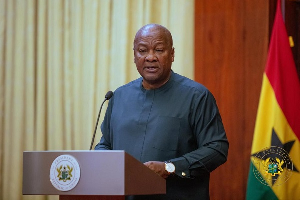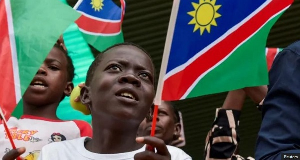The African Court on Human and Peoples' Rights has expressed concern about recent calls for the establishment of an African Court attributed to Mr Chris Addy-Nayo of the National Democratic Congress at The Hague, Netherlands.
“We urge our African compatriots to undertake research on issues they intend speaking on at the international environment to avoid public embarrassment. There is an African Court based in Arusha, Tanzania which is a continental court established by African Union to ensure the protection of human and peoples’ rights in Africa.
“It complements and reinforces the functions of the African Commission on Human and Peoples' Rights.
The African Court was established by virtue of Article 1 of the Protocol to the African Charter on Human and Peoples' Rights on the Establishment of an African Court on Human and Peoples’ Rights, (the Protocol) which was adopted by Member States of the then Organization of African Unity (OAU) in Ouagadougou, Burkina Faso, in June 1998.
“The Protocol came into force on January 25, 2004,” African Court stated in a rejoinder to a publication under the headline: “NDC Member calls for the establishment of a continental African Court,” published on September 5, this year.
According to the publication Mr Addy-Nayo, Member of the Ghanaian Opposition Party the NDC called for the establishment of an African Court which should be a subsidiary of the International Criminal Court (ICC) in Africa for the trial of Africans accused of human rights abuses, impunity and genocide.
According to the publication Mr Addy-Nayo made the remarks at a meeting with Officials of ICC at The Hague, Netherlands during a visit with a team of NDC members.
The African Court statement signed by Mr Sukhdev Chhatbar, Senior Information and Communication Officer and copied to the Ghana News Agency in Accra on Friday explained that Ghana is among 30 States Parties which have ratified the Protocol.
They are: Algeria, Benin, Burkina Faso, Burundi, Cameroon, Chad, Côte d’Ivoire, Comoros, Congo, Gabon, Gambia, Kenya, Libya, Lesotho, Mali, Malawi, Mozambique, Mauritania, Mauritius, Nigeria, Niger, Rwanda, Sahrawi Arab Democratic Republic, South Africa, Senegal, Tanzania, Togo, Tunisia and Uganda.
“Ghana is also among eight States including Benin, Burkina Faso, Côte d’Ivoire, Mali, Malawi, Tanzania and Rep. of Tunisia who as at July 2017, had made the declaration recognizing the competence of the African Court to receive cases from NGOs and individuals,” the African Court stated.
The African Court has jurisdiction over all cases and disputes submitted to it concerning the interpretation and application of the African Charter on Human and Peoples' Rights, (the Charter), the Protocol and any other relevant human rights instrument ratified by the States concerned. Specifically, the African Court has two types of jurisdiction: contentious and advisory.
The African Court is composed of eleven Judges, nationals of Member States of the African Union.
The first Judges of the Court were elected in January 2006 in Khartoum, Sudan. They were sworn in before the 7th Assembly of Heads of State and Government of the African Union on 2 July 2006, in Banjul, the Gambia.
The Judges of the Court are elected, after nomination by their respective States, in their individual capacities, from among African jurists of proven integrity and of recognized practical, judicial or academic competence and experience in the field of human rights.
The Judges are elected for a six year term, renewable once. The Judges of the African Court elect from among themselves, a President and Vice-President of the Court who serve a two year term. They can be re-elected only once.
The President of the African Court resides and works on a full time basis at the seat of the Court, while the other ten Judges work on a part-time basis. In the accomplishment of his/her duties, the President is assisted by a Registrar who performs registry, managerial and administrative functions of the Court.
The Court delivered its first judgment in 2009. As at 30th August 2017, the Court had received 147 applications and finalized 32 cases.
Politics of Friday, 15 September 2017
Source: ghananewsagency.org

















